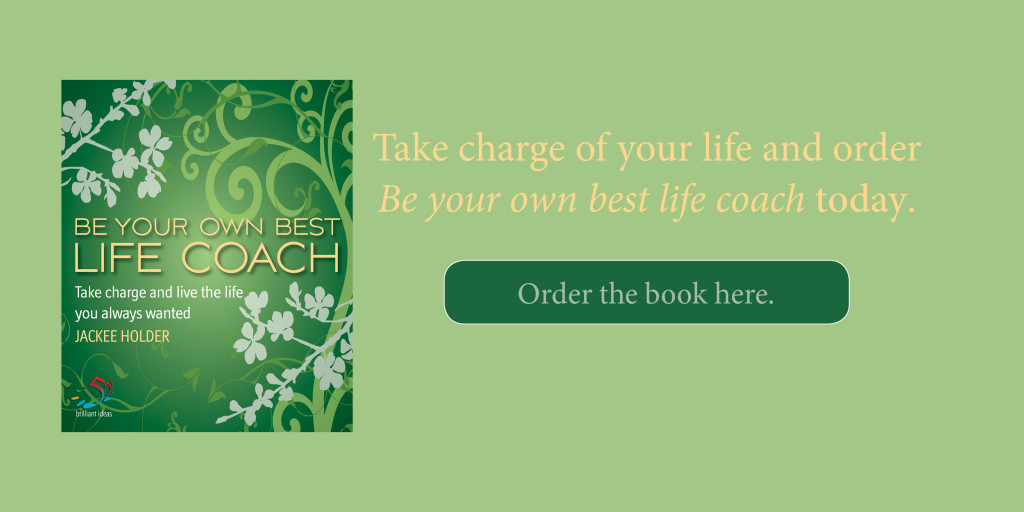Break your bad habits: Letting go of defence mechanisms
25 April 2014 by Infinite Ideas in Lifestyle
by Jackee Holder, author Be your own best life coach
Coaching yourself requires drawing on huge amounts of self-honesty, openness and confidence. A friend of mine was surprised by my recent comment about not always feeling confident. It got me thinking. Confidence is something I’ve learnt to do. It’s also a way I’ve defended myself (for more information on defence mechanisms check out chapter 19 in Be your own best life coach).
Sometimes my confidence is motivated by experiences of racism growing up in inner city London and wanting to prove that I’m good enough to those who didn’t think I was. Other times it’s fuelled by the memory of a physically abusive boyfriend when I was aged seventeen, and more often than not it’s to protect myself against the low-self esteem inherited through a trauma I experienced at the age of seven. This bravado of confidence sometimes means that when I’m being vulnerable people miss it or just don’t get it. It’s hard work always trying to get it right, running a perfectionist streak to prove that you are good enough.
During childhood we construct certain patterns of behaviours to protect ourselves against negative feelings and pain. We call these protective barriers defence mechanisms. For example to protect yourself from a violent or angry parent you may have learnt how to be quiet (even if this was not your true nature) and go unnoticed so as not to be a sitting target. As the years progressed this form of behaviour extended beyond the family home into school, with friends and as adults into the workplace and into relationships. Or perhaps as a child you grew up with alcoholic parents which meant that in order to survive you subconsciously developed care taking qualities, often denying your own true feelings at the expense of putting other people’s needs first. Can you see where this is going?
There’s no doubt that when asked any one of us could provide valid, strong and justified reasons for constructing these barriers. In many instances the creation of these protective walls and defences would literally have saved lives. However, these early intrusions can actually get in the way of healthy and natural development. When we feel vulnerable it can be hard to imagine that we will ever emerge whole and better off. We want to ward off yucky emotions like shame and humiliation, so we fall back on what we know and our defences become entrenched. Our reactions and responses become more and more habitual and automated. In no time at all we’ve established a well-oiled response even when we’re intellectually aware that how we are responding may not be the best or only way.
But it’s worth remembering that as adults we get to choose how much our past informs our present and how we choose to react in the here and now. Here are some tips on how to coach yourself to break free of defence mechanisms and practice new ways of responding and engaging.
Go in the opposite direction
Break the cycle and practice doing the opposite of what you would normally do, even if it feels difficult, awkward or uncomfortable.
Practice mindfulness
Take a moment to pause, connect with the feelings in your body before you take action. Get into a habit of becoming more mindful which will give you more spaciousness and awareness. Self-awareness is key to generating shifts and making change.
Ask yourself how your defences are limiting you or holding you back:
What’s the cost to me of habitually responding in this way?
How do I get in my own way?
What am I not seeing or ignoring right now?
Give yourself permission to experience real intimacy
Being defended or guarded sabotages real opportunities for exploring and experiencing true intimacy. The self-protective barriers put you in a catch 22 position. Vulnerability requires letting down your guard, removing all or a good chunk of your armour and navigating uncomfortable and unfamiliar territory.
Contemplate this question from relationship expert Sarah Abell:
How could I act differently if I did value connection over protection?
Separate the event from the emotions
Part of breaking away from old defensiveness patterns means learning how to separate the event from the emotions. Too often it’s easy to fall into the trap of believing that the intensity of your emotions will consume you. In fact the opposite is often the case. Practice being with your feelings, rather than pushing them away. Don’t try to change them, instead notice them. Soon the intensity of the emotion will subside and in time you will be able to see the wood for the trees.
Have a dialogue with your defences
What was your original intention or purpose?
What were they protecting me from?
Speak directly with your defence mechanisms and let them know what you are grateful for and why you are now choosing to let them go.
Over the next few days contemplate and reflect on the following quote from psychologist Dorothy Rowe:
“Defences keep us stuck in one unhappy place. It takes truth and courage to abandon them, but once we do we discover a world of freedom and wonderful possibilities.”
When you really get behind your defence mechanisms, when you fully understand how they got there in the first place, and when you make the time to examine their effectiveness at this point in your life, so much in your life will shift. I hope this article will help you to realize that it’s time to make the majority of your defence mechanisms redundant.
Don’t forget that a coaching session with a professional life coach can provide a much-needed space for you to let down your guard, to allow more of your true self to be seen and to talk about what you are really feeling or experiencing. To find out more about Jackee’s work visit www.jackeeholder.com, or follow @jackeeholder on Twitter.


